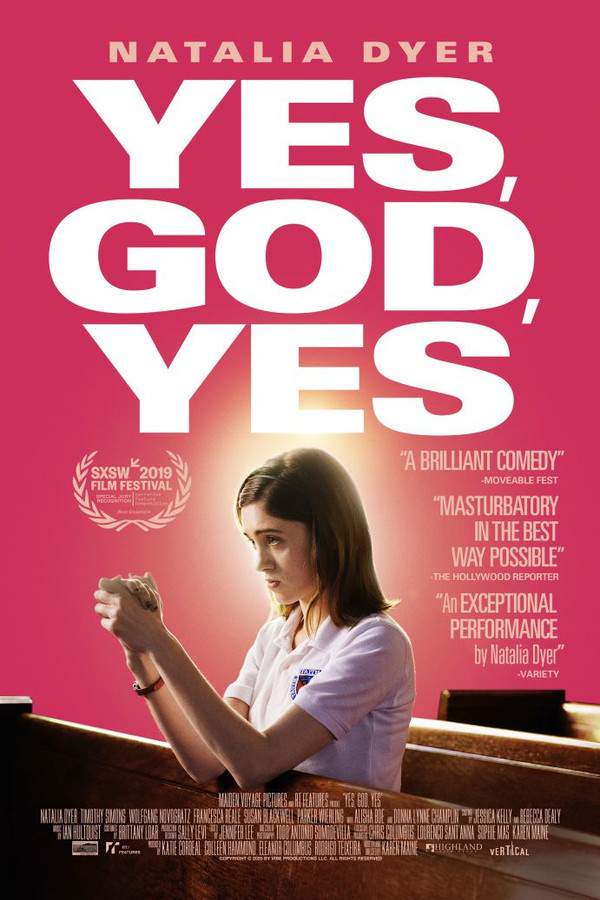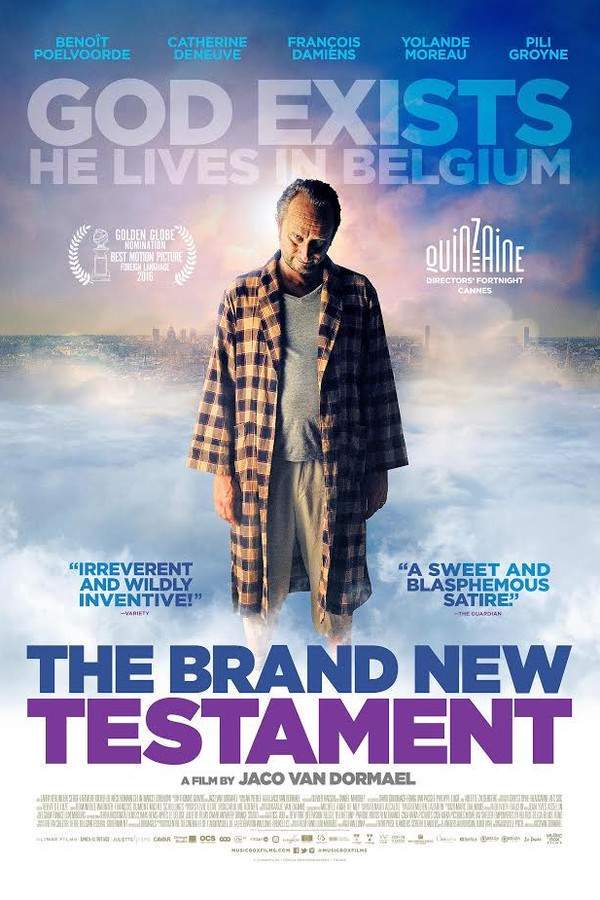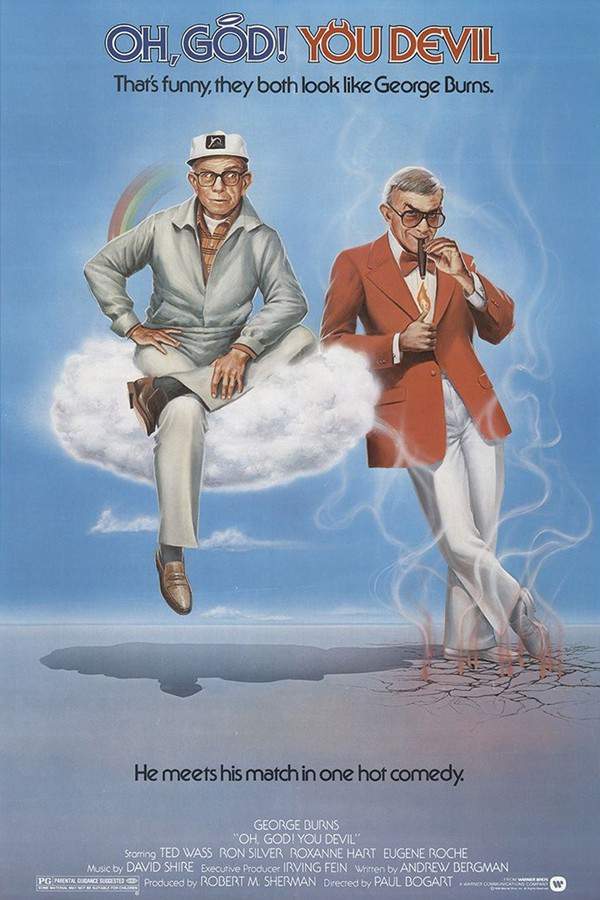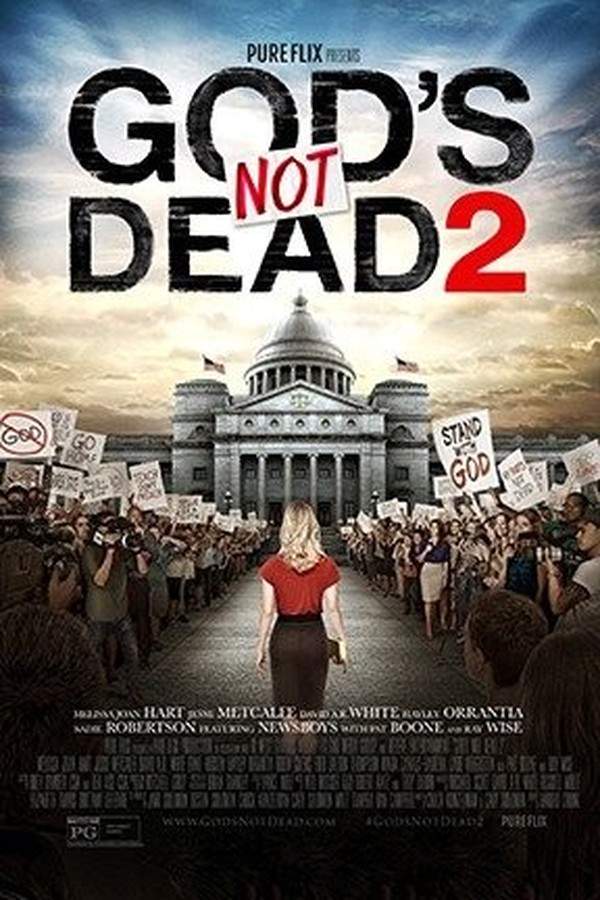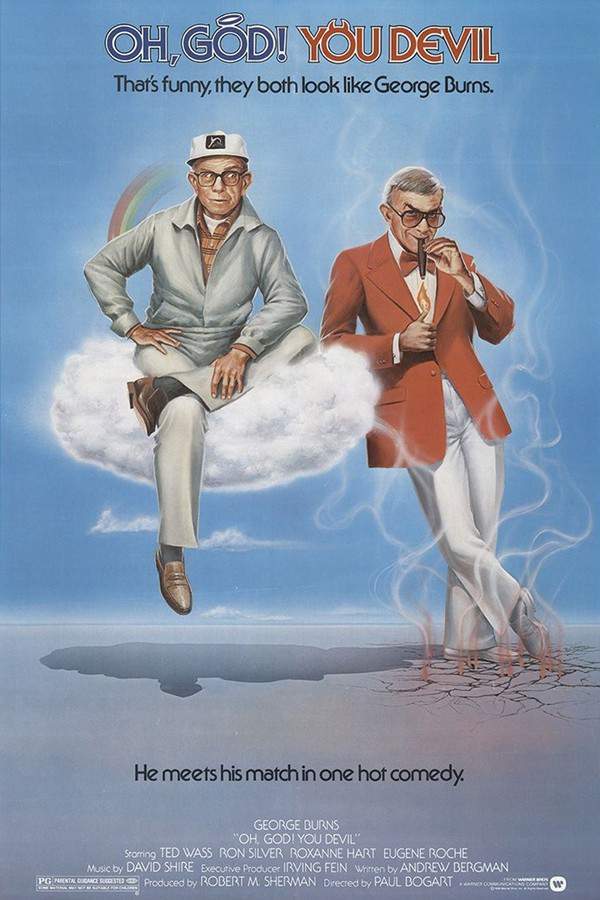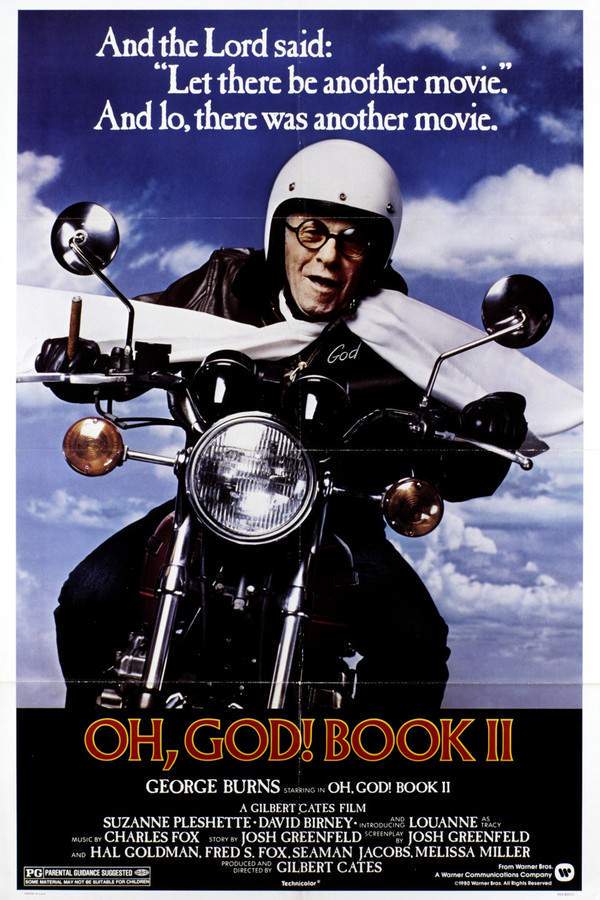
Oh, God! Book II 1980
Directed by

Gilbert Cates
Made by

Warner Bros.
Test your knowledge of Oh, God! Book II with our quiz!
Oh, God! Book II Plot Summary
Read the complete plot summary and ending explained for Oh, God! Book II (1980). From turning points to emotional moments, uncover what really happened and why it matters.
Young Tracy Richards, played by Louanne, enjoys playing basketball with her neighbor Shingo, portrayed by John Louie, until her divorced father, Don Richards, played by David Birney, arrives in his fiery red Jeep to take her on a special outing. Before they leave, Don’s ex-wife and Tracy’s mother, Paula, played by Suzanne Pleshette, reminds him to return Tracy at the agreed time.
During their meal of Chinese food, Don expresses his annoyance with the plot of a recent science-fiction movie. In contrast, Tracy shares her thoughts on the significance of believing in the intangible. When Don steps away to make a phone call, Tracy opens a fortune cookie that reads: > “Meet me in the lounge. - God.” A second fortune cookie reinforces the message: “I mean you, Tracy. - God.”
In the lounge, Tracy hears a man’s voice calling her from behind a red lacquer door. He introduces himself as God and asks for her assistance. Initially skeptical, Tracy suspects her father is playing a prank, but upon realizing that no one else can hear God’s voice, she becomes a firm believer. God praises her when she speaks about the importance of faith in unseen phenomena before his voice suddenly fades into silence.
On their drive home, Tracy mentions having a vague daydream, but Don, who is an advertising art director, reassures her that daydreaming is commonplace. He leaves her in the car briefly to grab work from his office, where God appears unexpectedly in the backseat, taking the form of an elderly man played by George Burns, dressed casually in a gray jacket, black-rimmed glasses, and a red shirt. When Tracy expresses her surprise at his appearance, expecting a divine figure in robes, God humorously quips that she has mixed him up with actor Charlton Heston. He laments the diminishing belief in him and seeks Tracy’s help in coming up with an advertising slogan to disseminate his message, appealing for one that resonates with children. Don later chimes in with tips for crafting effective slogans.
Back at home, Tracy inquires with the housekeeper, Rosa, whether she speaks to God. Rosa acknowledges her daily prayers but suggests that Tracy’s vivid imagination might be at play rather than a direct encounter. Subsequently, Tracy shares her divine experience with Shingo, who remains skeptical. However, when Tracy throws a basketball and scores a perfect shot, Shingo begins to question her story.
At school, Tracy’s teacher, Miss Hudson, reprimands her for being inattentive and not submitting her homework, leaving Tracy unable to articulate her disinterest. Back home, she becomes fixated on television commercials in her quest to devise a fitting slogan for God. During an episode of The Johnny Carson Show, God again materializes, this time directly in Tracy’s living room, extending her deadline for the slogan with the suggestion to collaborate with Shingo, eventually leading to the tagline, “Think God.”
The next day at a local McDonald’s, Tracy presents her slogan to God, who explains that the next phase involves spreading the word. Despite her concerns about falling behind in schoolwork due to the added responsibility, God encourages her to proceed, resulting in Tracy rallying her classmates to create posters and chalk messages throughout the town. However, Paula receives a letter from Miss Hudson, prompting her to confront Tracy about her claims of divine visitation. When Tracy insists on her experiences, Paula, in disbelief, pushes for her daughter to focus on her studies while Shingo brings in his cousins to help promote the campaign.
Later, as school authorities intervene, Tracy feels overwhelmed, voicing her frustrations to God about the consequences of her actions. God comforts her by magically completing her math homework. As her parents probe her about the situation, Don leans towards seeking help from a psychiatrist, while Paula wishes to manage things internally. They resolve to monitor Tracy’s behavior for a few days.
At school again, principal Mr. Benson organizes a meeting regarding Tracy’s persistence in her God campaign. When threatened with expulsion, she agrees to cease her activities if God consents to the plan. However, after learning of her divine encounter through a fortune cookie, the principal suspends her, citing the need for professional intervention.
In a twist of events, Tracy’s friends stage a picket in support of her return to school. In response, Don and Paula take her to see Dr. Jerome Newell, played by Anthony Holland, who conducts tests to evaluate her mental state. His assessment suggests that Tracy has created an imaginary father figure to cope with the absence of her real father, and he proposes she enter a mental health facility in Santa Barbara. Amid the pending treatment, Tracy searches various places of worship for God but finds no trace of him.
Driven to desperation, Tracy decides to run away, with Shingo assisting her in hiding at his grandparents’ house. However, upon learning Don’s confrontation with Shingo, Tracy evacuates to the Union Train Station. Here, God finally shows up, driving her home in a motorcycle sidecar after effectively evading two pursuing policemen. When Tracy’s parents discover her safely back in bed, she explains how God guided her home.
As the story unfolds, news spreads about Tracy’s popular slogan gaining international acclaim. In court, a judge orders a panel of psychiatrists to evaluate her mental condition. As their conclusion leans toward treatment, God surprises everyone by appearing as Dr. Stevens, a psychiatrist. He showcases his powers by making a chandelier vanish and twist day into night before mysteriously departing. The stunned panel is left devoid of words as the Richards take Tracy home.
In a heartfelt conclusion, the Richards celebrate at their favorite Chinese restaurant where Tracy receives a new message from a fortune cookie, leading her to the lounge. There, God expresses gratitude to Tracy and her friends for their extraordinary campaign, leaving her wistful yet hopeful as he promises to reach out if he faces a significant challenge in the future.
Oh, God! Book II Timeline
Follow the complete movie timeline of Oh, God! Book II (1980) with every major event in chronological order. Great for understanding complex plots and story progression.
Tracy's Basketball Games
Young Tracy Richards enjoys playing basketball with her neighbor Shingo on the local courts. Their friendship is highlighted as they bond over the sport, establishing a carefree and joyful atmosphere.
Visit from Don
Tracy's divorced father, Don Richards, arrives in a fiery red Jeep to take her on a special outing. Before they head out, Paula, Tracy's mother, reminds Don to have Tracy back home at the agreed time.
Chinese Food and Unusual Fortunes
During their meal at a Chinese restaurant, Don complains about a science-fiction movie while Tracy reflects on the importance of believing in the intangible. When she opens a fortune cookie, she discovers a peculiar message that reads: 'Meet me in the lounge. - God.'
Encounter with God
In the lounge, Tracy hears a voice calling her from behind a red lacquer door, introducing himself as God. Initially doubtful, she realizes he's genuinely communicating with her, leading her to express thoughts about faith and belief in unseen things before he suddenly vanishes.
God Appears in the Car
On their drive home, while Don goes to fetch work from his office, God appears unexpectedly in the backseat of the car as an elderly man. This humorous encounter challenges Tracy's expectations, as God expresses his need for help in crafting an advertising slogan for his message.
Seeking Assistance from Rosa
Back at home, Tracy asks the housekeeper, Rosa, if she speaks to God. Rosa replies affirmatively about her prayers but suggests Tracy's encounter might stem from her imagination rather than an actual divine experience.
Basketball Shot Sparks Doubt
Tracy shares her incredible experience with Shingo, who finds her claims hard to believe. However, after witnessing her perfect basketball shot, Shingo starts to reconsider his skepticism about her story and the potential reality of her encounter.
God's Living Room Visit
While watching The Johnny Carson Show at home, God appears in Tracy's living room, extending the deadline for her slogan creation. He encourages her to collaborate with Shingo, leading to the impactful tagline, 'Think God.'
Rallying the Classmates
Tracy becomes increasingly involved in the campaign, which involves spreading God's message. Though worried about her school responsibilities, she rallies her classmates to help create posters and chalk messages around town despite her mother’s concerns.
Conflict with Paula
Tracy's mother Paula confronts her about her divine claims after receiving a letter from Tracy’s teacher. As Paula pushes her daughter to focus on academics, Tracy becomes frustrated, feeling misunderstood and unsupported in her beliefs.
Seeking Professional Help
As the situation escalates, school authorities intervene, prompting a meeting regarding Tracy's campaign. Faced with the threat of expulsion, Tracy agrees to cease her activities, but soon finds herself suspended after sharing her extraordinary experiences.
Medical Evaluation
Tracy's parents take her to see a psychiatrist, Dr. Jerome Newell, for evaluation after her school situation worsens. His analysis suggests that Tracy created an imaginary father figure to cope with her real father's absence, proposing treatment in a mental health facility.
Running Away
Feeling overwhelmed by the adults' disbelief and the demands of the situation, Tracy decides to run away. With Shingo's help, she seeks refuge at his grandparents' house to escape the pressures from her parents and school.
God's Arrival at the Train Station
At the Union Train Station, after a series of events unfold, God appears to Tracy and drives her home in a motorcycle sidecar. This magical encounter alleviates her worries, providing her with a sense of safety and comfort after a chaotic experience.
Celebration and New Message
The Richards celebrate at their favorite Chinese restaurant, and Tracy receives yet another fortune cookie message. This message leads her back to the lounge, where God thanks her for their campaign, leaving her with a sense of hope and determination for the future.
Oh, God! Book II Characters
Explore all characters from Oh, God! Book II (1980). Get detailed profiles with their roles, arcs, and key relationships explained.
Tracy Richards (Louanne)
Tracy is a curious and imaginative young girl who grapples with her belief in God as she navigates the challenges of childhood. Her journey reflects a transformation from skepticism to faith, showcasing her resilience and determination to express her divine encounters. Despite facing disbelief from adults around her, she maintains a strong sense of hope and purpose.
Don Richards (David Birney)
Don is Tracy's divorced father, portrayed as pragmatic yet frustrated by the complexities of parenting his imaginative daughter. His character often embodies the tension between logic and faith, as he struggles to balance work, his relationship with Paula, and his responsibilities as a father. His interactions with Tracy reveal his underlying concern for her well-being.
God (George Burns)
God appears as a humorous and relatable elderly man, seeking Tracy's help to rekindle belief in Him. His character serves as a bridge between the divine and the mundane, using wit and charm to communicate complex ideas of faith. He offers guidance and encouragement to Tracy, embodying the notion that spirituality can be playful and accessible.
Paula Richards (Suzanne Pleshette)
Paula is Tracy's mother, who navigates the challenges of co-parenting and the skepticism surrounding Tracy's divine experiences. She represents the adult world's doubt and concern yet ultimately cares deeply for her daughter's happiness. Her character highlights the tensions in reconciling beliefs and maintaining family unity.
Oh, God! Book II Settings
Learn where and when Oh, God! Book II (1980) takes place. Explore the film’s settings, era, and how they shape the narrative.
Time period
The film appears to take place in contemporary times relative to its release in the early 1980s, notably depicted through the use of modern technology and cultural references such as The Johnny Carson Show. This period is characterized by shifting family dynamics and evolving societal norms, particularly in relation to the perception of spirituality and mental health.
Location
Chinese restaurant, Union Train Station, Santa Barbara
The movie features various locations such as a Chinese restaurant where the Richards family shares meals and moments, highlighting their familial bond. The Union Train Station serves as a critical location during Tracy's run away, adding a sense of urgency and adventure to the storyline. Santa Barbara is mentioned as a place considered for Tracy's mental health treatment, known for its beautiful coastal views and warm climate.
Oh, God! Book II Themes
Discover the main themes in Oh, God! Book II (1980). Analyze the deeper meanings, emotional layers, and social commentary behind the film.
🌟
Faith
The theme of faith is central to the film, particularly through Tracy's interactions with God and her journey of belief. It explores the idea of believing in the intangible and how that belief impacts her relationships with her parents and peers. The film ultimately presents a message of hope and the power of faith to influence actions and inspire others.
👩👧
Family
Family dynamics are at the forefront, highlighting the complex relationships between Tracy, her father Don, and her mother Paula. Their interactions reflect the challenges of co-parenting post-divorce, as well as the struggle to understand and support Tracy's unique experiences. The film emphasizes the importance of familial support in navigating childhood challenges.
📺
Imagination
Imagination serves as a significant theme, illustrated through Tracy's vivid experiences with God and her efforts to create an appealing slogan. The film suggests that imagination can foster connection with the divine and is a powerful tool for children to explore their beliefs. It also critiques adult skepticism towards children's creativity and understanding of faith.

Coming soon on iOS and Android
The Plot Explained Mobile App
From blockbusters to hidden gems — dive into movie stories anytime, anywhere. Save your favorites, discover plots faster, and never miss a twist again.
Sign up to be the first to know when we launch. Your email stays private — always.
Oh, God! Book II Spoiler-Free Summary
Discover the spoiler-free summary of Oh, God! Book II (1980). Get a concise overview without any spoilers.
In a sun‑drenched suburb where the ordinary collides with the inexplicable, Tracy Richards is a bright‑eyed teenager whose life is already a mixture of basketball games, schoolyard chatter, and the usual teenage worries. One ordinary afternoon the universe slips a startling invitation into her world, and she finds herself hearing the voice of God—a warm, witty presence that chooses her, an unlikely messenger, to help spread a simple, hopeful idea. The film frames this extraordinary encounter with a breezy, almost comic‑book sensibility, letting the surreal feel as natural as a summer breeze slipping through open windows.
Tracy’s home life is a study in gentle contradictions. Her divorced father, Don, an advertising art director with a pragmatic streak, tries to balance work and parenting while keeping the household grounded. Her mother, Paula, a caring but conventional figure, worries about school grades and the usual milestones of growing up. Their perspectives clash with Tracy’s newfound mission, creating a subtle tonal tension between the adult world’s skepticism and the child’s boundless belief. Meanwhile, her neighbor and confidant Shingo offers the kind of peer support that feels both grounding and encouraging, highlighting the ordinary friendships that anchor her extraordinary undertaking.
The movie’s tone walks a tightrope between lighthearted comedy and earnest coming‑of‑age reflection. It riffs on the absurdity of divine messages delivered in modern settings, peppering the narrative with playful banter, quirky visual jokes, and a soundtrack that feels as bright as a summer afternoon. Yet beneath the humor lies a sincere exploration of faith, imagination, and the struggle to be heard when the world seems intent on dismissing the invisible.
As Tracy navigates school, family expectations, and the weight of a message that feels both personal and universal, the film invites the audience to wonder whether belief can bridge the gap between the mundane and the miraculous. The story promises a journey that is as much about the growth of a young girl discovering her voice as it is about a whimsical partnership that challenges everyone around her to look beyond what they can see.
Can’t find your movie? Request a summary here.
Movies with Similar Twists and Themes
Uncover films that echo the narrative beats, emotional arcs, or dramatic twists of the one you're exploring. These recommendations are handpicked based on story depth, thematic resonance, and spoiler-worthy moments — perfect for fans who crave more of the same intrigue.
Featured on this page

What's After the Movie?
Not sure whether to stay after the credits? Find out!
Explore Our Movie Platform
New Movie Releases (2026)
Famous Movie Actors
Top Film Production Studios
Movie Plot Summaries & Endings
Major Movie Awards & Winners
Best Concert Films & Music Documentaries
Movie Collections and Curated Lists
© 2026 What's After the Movie. All rights reserved.


